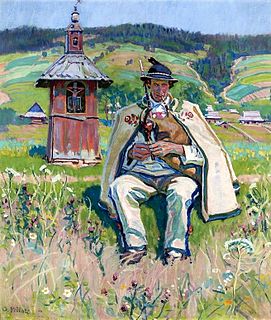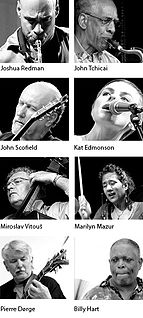
Katowice is a city in southern Poland, with a city-proper population of 297,197 making it the eleventh-largest city in Poland as of 2017 and is the center of the Katowice metropolitan area, which has approximately 2 million people.

Andrzej Witold Wajda was a Polish film and theatre director. Recipient of an Honorary Oscar, the Palme d'Or, as well as Honorary Golden Lion and Golden Bear Awards, he was a prominent member of the "Polish Film School". He was known especially for his trilogy of war films consisting of A Generation (1954), Kanał (1956) and Ashes and Diamonds (1958).
The Music of Poland covers diverse aspects of music and musical traditions which have originated, and are practiced in Poland. Artists from Poland include world-famous classical composers like Frédéric Chopin, Witold Lutosławski, Krzysztof Penderecki, Karol Szymanowski and Henryk Górecki; renowned pianists like Arthur Rubinstein, Ignacy Jan Paderewski, and Krystian Zimerman; as well as popular music artists, and traditional, regionalised folk music ensembles that create a rich and lively music scene at the grassroots level. The musicians of Poland, over the course of history, have developed and popularized a variety of music genres and folk dances such as mazurka, polonaise, krakowiak, polska partner dance, oberek; as well as the sung poetry genre and others.

The Eastern Bloc was the group of communist states of Central and Eastern Europe, East Asia and Southeast Asia under the hegemony of the Soviet Union (USSR) during the Cold War (1947–1991) in opposition to the capitalist Western Bloc. Generally, in Western Europe the term Eastern Bloc referred to the USSR and its East European satellite states in the Council for Mutual Economic Assistance (Comecon); in Asia, the socialist bloc comprised the Socialist Republic of Vietnam, the Lao People's Democratic Republic and the People's Republic of Kampuchea, the Democratic People's Republic of Korea, and the People's Republic of China. In the Americas, the communist bloc included the Caribbean Republic of Cuba, since 1961.

The Polish People's Republic was a communist satellite state in Central Europe that existed from 1947 to 1989, and the predecessor of the modern democratic Republic of Poland. With a population of approximately 37.9 million inhabitants near the end of its existence, it was the most populous state of the Eastern Bloc after the Soviet Union. Having a unitary Marxist–Leninist communist government imposed by the Soviet Union following World War II, it was also one of the main signatories of the Warsaw Pact. The largest city and official capital since 1947 was Warsaw, followed by industrial Łódź and cultural Kraków.
The Sopot International Song Festival is an annual international song contest held in Sopot, Poland. It was the biggest Polish music festival altogether with the National Festival of Polish Song in Opole, and one of the biggest song contests in Europe.

Jan Andrzej Paweł Kaczmarek is a Polish composer who has lived and worked in the United States since 1989. He has written the scores for more than 60 feature films and documentaries, including Finding Neverland (2004), for which score he won an Oscar and National Board of Review Award. Other notable scores were for Hachi: A Dog's Tale, Unfaithful, Evening, The Visitor, and Washington Square.
Warsaw Autumn(Warszawska Jesień) is the largest international Polish festival of contemporary music. Indeed, for many years, it was the only festival of its type in Central and Eastern Europe. It was founded in 1956 by two composers, Tadeusz Baird and Kazimierz Serocki, and officially established by the Head Board of the Polish Composers' Union. It is an annual event, normally taking place in the second half of September and lasts for 8 days.

The Gorals are an ethnographic group primarily found in their traditional area of southern Poland, northern Slovakia, and in the region of Cieszyn Silesia in the Czech Republic. There is also a significant Goral diaspora in the area of Bukovina in western Ukraine and in northern Romania, as well as in Chicago, the seat of the Polish Highlanders Alliance of North America.

The history of Solidarity, a Polish non-governmental trade union, began on August 14, 1980, at the Lenin Shipyards at its founding by Lech Wałęsa and others. In the early 1980s, it became the first independent labor union in a Soviet-bloc country. Solidarity gave rise to a broad, non-violent, anti-communist social movement that, at its height, claimed some 9.4 million members. It is considered to have contributed greatly to the fall of communism.

With the fall of communism Polish culture and society began a process of profound transformation, marked by the return of democracy and redevelopment of civil society. After 1989, the heavy government controls ended, and the radical economic changes were introduced. The influx of new aesthetic and social ideas was accompanied by the Western market forces. However, unlike any other temporal marker in the development of Polish culture from the past, the year 1989 did not introduce any specific literary events or artistic manifestations. For a generation of accomplished writers the objectives and their moral quests remained the same as in the preceding period. The first decade of freedom brought mainly state reforms in the financing of cultural institutions and patronage; forcing self-sustainability in an often uncharted territory. Literature, film, visual arts, theater and mass media remained focused on their active participation in public life.

Piknik is a Russian rock band known for its unique style which is a mixture of art rock, progressive rock and original Russian rock. The band was formed in 1978 in Leningrad by Sergey Omelnichenko, Evgeny Voloschuk, Aleksey Dobychin and Edmund Shklyarskiy. Piknik is considered to be one of the "classic" Russian rock bands. Originated from the classic rock with huge influence of Jethro Tull and Led Zeppelin, its music progressed into its own style with using symphonic and exotic folk instruments. Also Piknik is considered sometimes to be the first Russian gothic rock band due to its specific sound, stage performances and dark lyrics.

The following outline is provided as an overview of and topical guide to Poland:

Atmasfera is a unique melodious band from Ukraine, who play indie yoga music and world music combined with ancient mantras in Sanskrit. They combine ethnic motifs with a modern orchestral sound. Among the band's members are the twin daughters of Yuriy Yaremchuk, a musician of the genre of improvisational jazz and avant-garde.

Khaled Hadj Ibrahim, better known by his mononym Khaled, is an Algerian musician, singer and songwriter born in Oran, Algeria. He began recording in his early teens under the name Cheb Khaled, and has become the most internationally famous Algerian singer in the Arab world and across many continents. His popularity has earned him the unofficial title "King of Raï". His most famous songs are "Didi", "Aïcha" and "C'est la vie" as well as "Alech Taadi", which was prominently featured in the film The Fifth Element.

Katarzyna Milena Popowska also known as Kasia Popowska and PoppySinger is a Polish singer and a self-taught guitarist. Her debut album titled Tlen was released on 16 September 2014.
Discovery Networks CEEMEA was a branch of Discovery Networks International headquartered in Warsaw, Poland. The network was launched in February 2011, previously Discovery Networks CEEMEA was under Discovery Networks Europe.

Aarhus International Jazz Festival is an eight-day jazz festival in Aarhus, Denmark. It is held every year in July, August or September. The festival performs at the Aarhus Concert Hall, as well as many different venues across the city. Many concerts are played outdoors in the public space and are for free. Aarhus Jazz Festival has been awarded with the European Effe Label in 2017-2018. The 2018 festival was held from 14 to 21 July and the 2019 festival takes place from 13 to 20 July.














